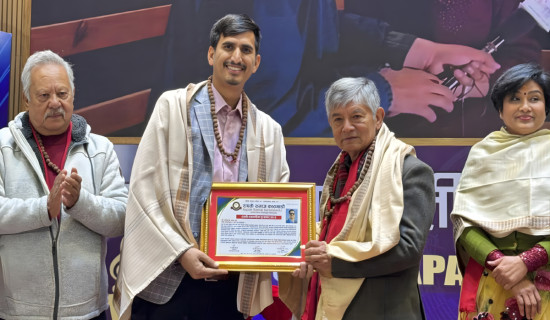- Sunday, 28 December 2025
Healthy Local Levels
Many well-trained doctors, pharmacists, nurses and other healthcare workers from Nepal have been migrating to developed countries in an alarming rate in search of better career opportunities. The continuous brain drain has caused the dearth of specialised doctors and health professionals in hospitals operating at central, provincial and local levels. On the one hand, there is the demand to increase budget in the health sector from the three-tier governments every year to overcome acute shortage of medical professionals and health infrastructures.
Skilled health professionals are concentrated in urban centres and they don’t want to go to serve in the rural areas, which has created a disparity of health care services between people living in the remote areas and those living in urban cities. Hospitals in the local levels are not provided with adequate doctors, but when locals levels themselves appointed the doctors and paid their salaries, the expenditure on salary of the appointed doctors is flagged as arrears. Despite all the problems, the hospitals in local levels have shown significant improvement in their service delivery lately. Performance of hospitals at the local level was outstanding during COVID-19 pandemic. There are times when the performance of hospitals at the local levels and provinces have outsmarted the service delivered at the centre.
A news published in this daily on Wednesday, the local level hospitals in Morang district are overcrowded with patients, as people find it difficult to get medical services in federal and provincial hospital because of the lack of adequate manpower there. Since the establishment of local government, Sundarharaicha, Belbari, Pathari Shanishchare, Ratuwamai and Rangeli municipalities, and Kanepokhari, Kerabari and Miklajung rural municipalities have been running local-level hospitals in the district. Pathari Shanishchare Municipal Hospital stands out as the top contributor to health services in Morang district. Likewise, the municipal hospital in Haraicha of Ward No. 1 of Sundarharaicha Municipality offers general services three days a week.
Despite requests for doctors from the federal and provincial governments, however, none have been provided. So the local levels in Morang appointed their own doctors. But the irony is that the Office of the Auditor General marked these doctors' salaries as arrear expenditures, creating legal problems. The government builds the hospital but does not depute adequate human resources. Although Article 35 of the constitution states that every citizen shall have right to free basic health services from the state, and no one shall be deprived of emergency health services, and every citizen shall have equal access to health services, general people are not gaining health care services envisioned by the national charter.
On the one hand, there's a critical need of health professionals in local level hospitals to provide sufficient medical care to the people and on the other, they face legal hurdles in this regard. This calls for an urgent need to revise concerned policies to authorise the local units to hire and pay the doctors and nurses. This is because the constitution provides at least 22 exclusive rights to the local bodies in addition to other concurrent rights shared by all three layers of government. The local units have rights to provide services related to health, education, drinking water, security and land registration, among others. It is imperative on the part of the centre to solve legal confusions as well as earmark the required budget to the local units, thereby enabling them to serve the people without any hassle.

















